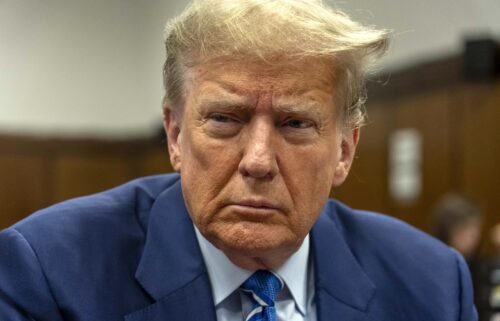Appeals court appears skeptical of Democrats’ challenge on Trump payments

A three-judge federal appeals court panel appeared skeptical during oral arguments Monday about letting a group of more than 200 congressional Democrats sue President Donald Trump over foreign payments to his businesses.
Judges on the US Court of Appeals for the District of Columbia Circuit questioned whether individual members of Congress have the legal right, or standing, to sue the President, regarding the Constitution’s emoluments clause.
“You’re not here representing Congress, so you can’t seek to protect the institutional interests of Congress,” Judge Thomas Griffith told lawyer Elizabeth Wydra of the Constitutional Accountability Center, which is representing the group.
Another member of the panel, Judge David Tatel, invoked the Supreme Court’s recent dismissal of a Virginia redistricting case, in which Justice Ruth Bader Ginsburg wrote that “individual members lack standing to assert the institutional interests of a legislature.”
The suit is being led by Sen. Richard Blumenthal of Connecticut and House Judiciary Chairman Jerry Nadler of New York, who on Monday was chairing a critical impeachment hearing as the court hearing proceeded.
Trump has broken previous presidential precedent by retaining his interest in his personal business, the Trump Organization, while in office, as well as by refusing to release his tax returns. That has triggered complaints from an array of watchdog and private groups, as well as the congressional Democrats, that Trump is in violation of the Constitution’s ban on emoluments, or payments.
The lawsuit by the members of Congress is one of several challenges to Trump’s financial arrangements. On Friday, Ginsburg put a temporary hold on House subpoenas requesting Trump’s financial documents from two banks.
Monday’s oral arguments came after a lower court allowed the Democratic members’ lawsuit to go forward. The appellate court agreed to step in and hear an early appeal before any subpoenas could go out.
After the appellate court said in June that it would hear the case, a federal judge in a lower court paused congressional Democrats’ subpoenas of Trump Organization financial records, 10 days before the records were due in the lawsuit.
Justice Department lawyers have argued in filings that the lower court was wrong to allow the lawsuit to proceed. In filings, they have said the legislators don’t have standing to sue because such a lawsuit must be brought by the entire Congress, “not an amalgam of individual legislators or even a single chamber of a bicameral body.”
They have also argued that the Constitution’s emoluments clause refers only to “compensation accepted from a foreign government for services rendered” and not a broader interpretation that covers “any profit or gain.”
On Monday, the panel questioned Justice Department attorney Hashim Mooppan about how Congress could respond to emoluments violations. “If you were right about standing, it does raise the question of what is the remedy to violations of the emoluments clause?” Griffith asked. “What is Congress to do?”
Mooppan told the panel that Congress needed to pass a new law if it wanted to stop Trump from accepting foreign payments to his businesses.
Following the hearing, Blumenthal said that if the court continues to let the president accept payments and benefits from foreign governments, “the Constitution itself will be dead letter.”
“He’s betraying the Constitution. The courts have to stop it. And we are doing our job by coming here,” Blumenthal told reporters.




